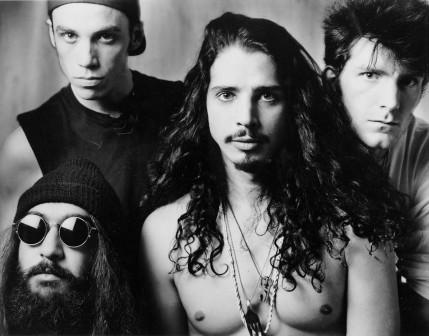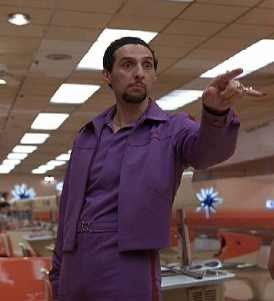This is the first of a new series of posts where I'm going to tell you about things -movies, music, Tv- that I love and why you should love them too.
The main character of The Big Lebowski seems like a fairly intelligent guy who's wise to the world, but he doesn't really want to do much of anything besides go bowling, smoke pot, and generally relax.
That main character is Jeffrey "The Dude" Lebowski (Jeff Bridges), introduced by the film's rambling narrator (Sam Elliott) as "quite possibly the laziest man in Los Angeles county." The Dude is unemployed, needless to say, and spends most of his time at the bowling alley with his two best friends, Walter (John Goodman), a borderline-psychotic who's in the habit of pulling a gun when he thinks somebody's cheating in a bowling match ("Has the whole world gone CRAZY?!" he shouts at a suspected cheater), and Donny (Steve Buscemi), who's always a few steps behind the conversation and is constantly berated by Walter for it ("Donny, you have no frame of reference here!"). These three seem to more or less live for bowling tournaments, and as the film begins they are anticipating an important match with rival bowler Jesus Quintana (John Turturro), who, when we first meet him, is doing a dance in the bowling lane to accompany a Spanish version of "Hotel California" and, if it's possible, seems to be even more of a head case than Walter.
"Nobody fucks with the Jesus!"
If that doesn't give you a good idea of this film's absurdist tone, then perhaps this will: the entire scenario which drives the story is set in motion by two thugs mistakenly urinating on the Dude's rug. They've mistaken him for a millionaire of the same name who is also known as the "Big" Lebowski (David Huddleston) and whose nymphomaniac wife Bunny (Tara Reid) owes money to porn producer Jackie Treehorn (Ben Gazzara). The Dude goes to the Big Lebowski seeking compensation for his ruined rug; he doesn't have any luck, but when Bunny is apparently kidnapped, the elder Lebowski asks him to deliver the $1 million ransom.
Unfortunately, Walter gets involved and fouls up the drop-off, and before they can try again to get the money to the supposed kidnappers, the Dude's car gets stolen, along with the briefcase containing the money. Soon, the Dude is being harassed not only by the Big Lebowski himself but also by Treehorn and by a group of German "nihilists" who demand the ransom money even though they may not have been involved in the kidnapping in the first place; the Dude and Walter suspect that Bunny may well have kidnapped herself in order to extort money from her husband to repay her debts to Treehorn. Meanwhile, the Big Lebowski's daughter Maude (Julianne Moore), a feminist avant-garde artist who likes to make grand entrances swinging through the air naked, wants to recover the money for her family.
"Mark it zero!

The plot, however, is really just a vehicle for all these bizarre characters to run wild and wreak their own unique forms of havoc. The Coens see Los Angeles as a veritable jungle of oddballs and nutcases, with the sometimes bewildered Dude left to run through it and try to avoid any more trouble (usually unsuccessfully). The film doesn't feature quite as many one-liners and sight gags as the Coens' other comedies (though there are a few hilarious moments of visual humor, particularly in the Dude's dream sequences and acid flashbacks), but it more than makes up for it with the sheer fun of watching these strange characters interact. The film sometimes seems a little disjointed as a result - you get the feeling that the Coens have not only set their characters loose in this "jungle" but are also themselves running crazy through the jungle of their own twisted imaginations - but for the most part the characterizations are interesting enough to overcome the shaky plotting and what turns out to be a somewhat anticlimactic resolution.
There's also a noticeable (but not too heavy-handed) thread of social commentary in TBL, which, incidentally, takes place just as the Gulf War is about to begin; at the beginning, we see George Bush on television making his "This aggression will not stand" speech. The Coens take aim at just about every elite L.A. subculture in the book: the egotistical wealthy businessman ("The bums will always lose!" shouts the Big Lebowski at one point), the porn industry, the overbearing Malibu policeman who berates the Dude for disturbing their "peaceful beach community," and so on. By the end, we really start to admire the Dude, who almost certainly harbors the least "aggression" of anyone in this story; his passive resistance (emphasis on "passive," albeit) to the elite emerges as something more than just another quirky characterization in a film overflowing with quirky characters.
He also turns out to have a pretty well-functioning brain in his head, even if he doesn't like to use it very much; his sarcasm towards Treehorn and the Malibu policeman shows that he knows when he's getting a run around, and he does manage to unravel the kidnapping mystery by the end. The Coens certainly poke fun at the Dude for his laziness, but they don't just treat him as fodder for cheap shots either. I think that, more than anything, is what makes TBL a standout comedy: it manages to approach characters like the Dude and, to some extent, Walter, with genuine affection while still acknowledging that they are pretty scatter-brained. First time viewers may find themselves surprised at how much they like the un-dynamic duo by the end of the movie, given that they seemed like nothing more than the butts of an extended joke at first. "It's good knowin' he's out there, the Dude, takin' it easy," opines the narrator towards the end. I dare say that truer words have seldom been spoken
"That's, like, just your opinion, man"




























